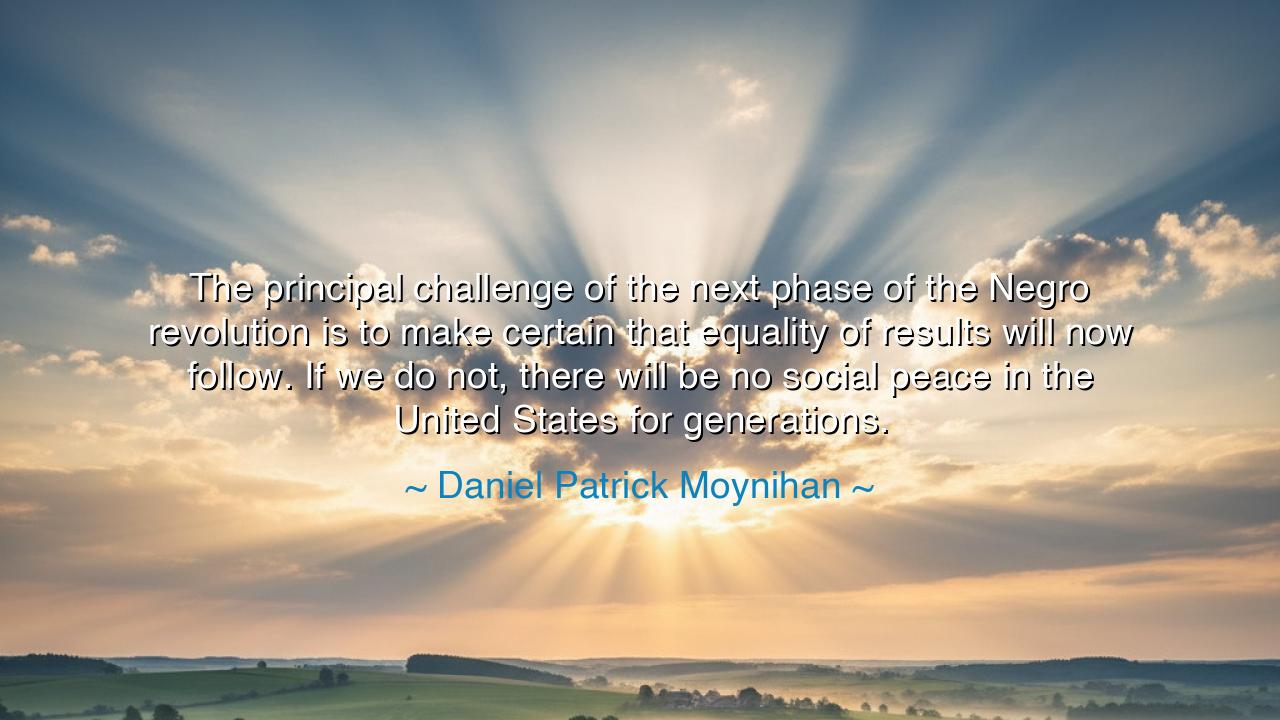
The principal challenge of the next phase of the Negro revolution
The principal challenge of the next phase of the Negro revolution is to make certain that equality of results will now follow. If we do not, there will be no social peace in the United States for generations.






O Children of the Future, heed the words of Daniel Patrick Moynihan, for his words carry the weight of both wisdom and warning. He speaks with urgency and foresight, saying: "The principal challenge of the next phase of the Negro revolution is to make certain that equality of results will now follow. If we do not, there will be no social peace in the United States for generations." These words, filled with both hope and concern, remind us that the struggle for equality is not merely about the removal of barriers; it is about the realization of tangible, measurable results—the transformation of society into one where all people, regardless of their race, have an equal chance to thrive. Without these results, Moynihan warns, the social peace we seek will remain elusive, and the struggle for justice will persist.
In the ancient world, O Children, the great civilizations struggled with the question of justice and equality. The Greeks and Romans built their empires upon principles of order, but their societies were steeped in inequality. Slavery was widespread, and women, despite their contributions, were often excluded from the decision-making processes. Socrates, in his search for virtue, did not envision a society where all were treated as equals—only a select few were deemed worthy of participation in the public life of the city-state. Plato, though a visionary, could not see a world where the masses, regardless of their birth, were free to pursue their own path to prosperity and dignity. Thus, the idea of equality of results—not merely equality before the law—remained a distant ideal, a challenge that future generations would have to confront.
In our own time, Daniel Patrick Moynihan speaks to us of the challenge of equality of results—the idea that justice cannot be measured by laws alone, but by the real, lived experiences of individuals. The Civil Rights Movement in the United States, led by figures like Martin Luther King Jr. and Rosa Parks, was a monumental step toward ensuring equality before the law. Yet, as Moynihan notes, equality of results is a deeper and more elusive challenge. While the laws may have changed, many African-Americans still face significant barriers to achieving economic security, education, and political power. The results of equality—the opportunities to live a full and prosperous life—have not been fully realized for all.
Let us look to the story of Reconstruction in the aftermath of the Civil War. Following the Emancipation Proclamation and the 13th Amendment, there was a brief period of hope that the freed African-Americans could now fully participate in the society that had once enslaved them. The 14th and 15th Amendments promised equal protection under the law and the right to vote. Yet, despite these legal victories, the results were far from equal. Jim Crow laws emerged, stripping away rights and creating a system of segregation that would last for nearly a century. The promises of equality were never fully realized, and the fight for true equality—the equality of results—remained an ongoing struggle. This history teaches us that while legal equality is essential, it is economic, social, and cultural equality that ensures the dignity and opportunity of all people.
Moynihan’s insight is a powerful one: equality of results is not a luxury—it is a necessity for true social peace. When one group is denied the ability to fully participate in the economic, social, and political life of a society, the very fabric of that society is weakened. Disparities in wealth, education, and access to opportunity create division, distrust, and anger. Without the guarantee of equality in the outcomes of society—where every individual has an equal chance to succeed—there can be no lasting peace. The seeds of division will continue to grow, and the society will find itself in a state of constant unrest.
The lesson, O Children, is this: equality of results is the true measure of a just society. It is not enough to simply have laws that grant equality on paper; those laws must translate into real opportunities for all people, regardless of their race, gender, or background. The fight for equality is not just about changing the laws—it is about ensuring that those changes create tangible benefits for the lives of those who have been historically oppressed. This is the deeper work that must be done. Whether it is in addressing income inequality, ensuring equal access to education, or fighting for equal representation in government, the true goal is to create a society where everyone has the chance to reach their fullest potential.
O Children, take this wisdom with you: justice is not a distant hope but a living reality that must be fought for and made manifest in the world. Work to create a world where equality of results is not just a dream, but a reality. Advocate for policies that provide equal access to opportunity, healthcare, education, and political power. Stand with those whose voices have been silenced and whose opportunities have been restricted. For the future you inherit will be shaped by how you address the inequalities of today. Make it a future where equality is not just promised, but achieved, and where social peace can finally flourish.






AAdministratorAdministrator
Welcome, honored guests. Please leave a comment, we will respond soon